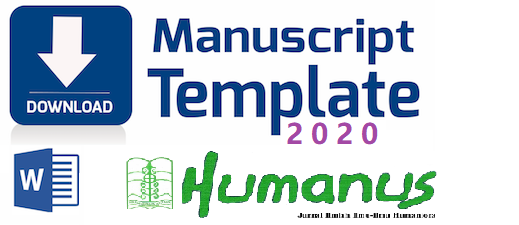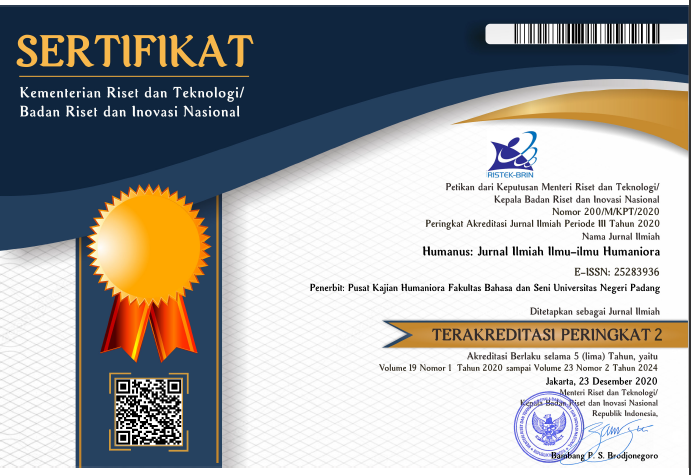THE MEANING OF TANDUAK DANCE AND ITS RELEVANCE TO THE CHARACTER OF THE NAGARI LUBUK TAROK COMMUNITY
 ), Sumaryadi Sumaryadi(2),
), Sumaryadi Sumaryadi(2), (1) Yogyakarta State University
(2) Yogyakarta State University
 Corresponding Author
Corresponding Author
Copyright (c) 2019 Humanus
DOI : https://doi.org/10.24036/humanus.v18i1.102227
Full Text:
 Language : en
Language : en
Abstract
This study aims to find and explain the meaning of Tanduak dance movements in Nagari Lubuk Tarok as well as their relevance to the value of character education. This study used a qualitative research in analyzing and finding a narrative from a Tanduak dance. Data sources in this study were obtained from key informants, interviews, and documents. Data collection techniques were carried out through participant observation, documentation and other findings. Data analysis techniques used consist of data reduction, data display and conclusion drawing/verification. The results of this study indicated that the Tanduak dance consists of three types of movements; ampek, salo and sambah. These three movements show a meaning relevant to the value of character education. Ampek means openness and respect for the audience, in line with friendly/communicative values. Salo means swift but sure, this movement is in harmony with the value of hard work and responsibility. Sambah means respect and hospitality, in line with the values of peace.
Keywords: tanduak, dance, character education
MAKNA TARI TANDUAK DAN RELEVANSINYA TERHADAP KARAKTER MASYARAKAT NAGARI LUBUK TAROK
Abstrak
Penelitian ini bertujuan untukmenjelaskan makna gerak tari Tanduak di Nagari Lubuk Tarok dan relevansinya terhadap nilai pendidikan karakter. Penelitian ini menggunakan jenis penelitian kualitatif yang digunakan dalam menganalisis dan menemukan suatu naratif dari sebuah fenomena tari Tanduak.Sumber data dalam penelitian ini diperoleh dari informan utama, wawancara, dan dokumen-dokumen. Teknik pengumpulan data dilakukan melalui observasi partisipan, dokumentasi. Teknik analisis data yang digunakan terdiri dari reduksi data, display data dan penarikan kesimpulan/verifikasi. Hasil penelitian ini menunjukkan bahwa tari Tanduak terdiri dari tiga ragam gerak yaitu gerak langkah ampek, gerak langkah salo dan gerak sambah/penutup. Ketiga gerak ini menunjukkan makna yang relevan dengan karakter masyarakatnya. Gerak langkah ampek bermakna keterbukaan dan penghormatan terhadap khalayak, selaras dengan nilai kebersamaan/komunikatif. Gerak langkah salo bermakna sigap namun pasti, gerak ini selaras dengan nilai kerja keras dan tanggung jawab. Gerak sambah/ penutup bermakna penghormatan dan ramah tamah, selaras dengan nilai cinta damai.
Kata kunci: tari tanduak, makna, karakter
Keywords
References
Anderson, T. (2004). Why and How We Make Art, with Implications for Art Education. Arts Education Policy Review, 105(5), 31.
Bogdan, R. C., & Biklen, S. K (2007). Qualitative research for education: An introduction to theories and methods. 2007. Perason Education Group, New York, 4.
Brinson, P. (2004). Dance as education: towards a national dance culture. Routledge.
Dewantara, K. H. (1967). Kebudayaan Bagian IIA. Jogyakarta L Madjelis Luhur Persatuan Taman Siswa.
Herlinah, H. (2017). Kelayakan Buku Teks Seni Budaya (Seni Rupa) untuk SMP Kelas VII Terbitan Tiga Serangkai Tahun 2015 Penulis: Kusnadi (Doctoral dissertation, Pascasarjana).
Langer, S. K. (1977). Pengantar Pengetahuan Tari.
Novitasari, Ana. (2019). The meaning of tanduak dance movements and their relevance to character education value. Padang
Robby, H. (2011). Koreografi & Kreativitas Pengetahuan Dan Petunjuk Praktikum Kareografi.
Rohidi, T. R. (2011). Metodologi penelitian seni. Semarang: Cipta Prima Nusantara, 75, 116-121.
Royce, P. A. (2007). Antropologi Tari. Sunan Ambu Press STSI, Bandung.
Perlshtein, T. (2014). A Connection of the Upper and the Lower Spheres: Perceptions and Positions of Observant Dance Teachers Towards the Teaching of Dance to Pupils in the Israeli General-Religious Education. Dance Now, 26, 80-91.
 Article Metrics
Article Metrics
 Abstract Views : 429 times
Abstract Views : 429 times
 PDF Downloaded : 110 times
PDF Downloaded : 110 times
Refbacks
- There are currently no refbacks.
Copyright (c) 2019 Humanus

This work is licensed under a Creative Commons Attribution-NonCommercial 4.0 International License.










